#MacroTrend
Photo
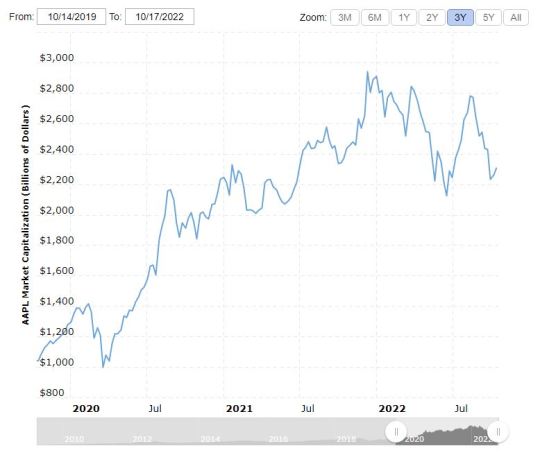
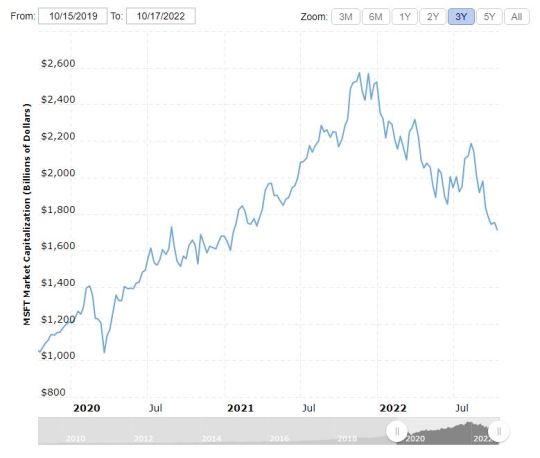
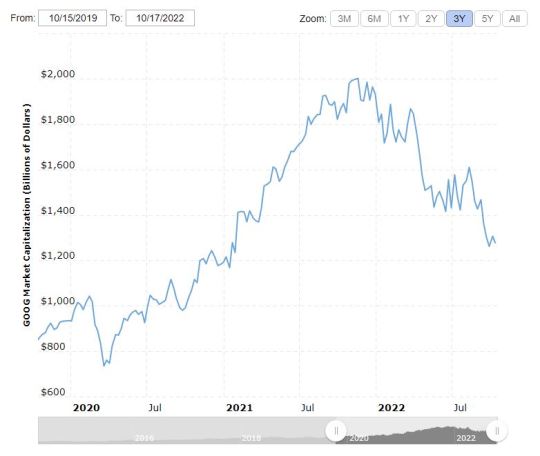
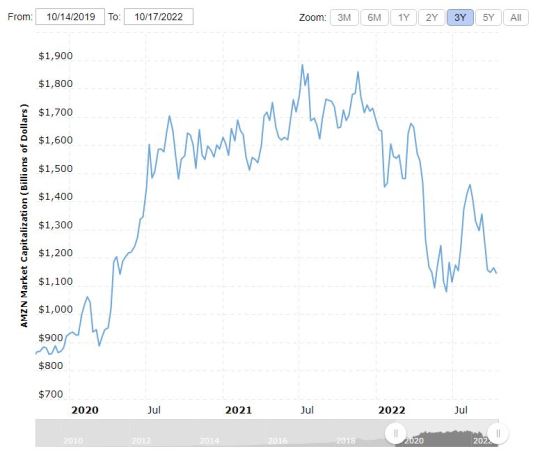
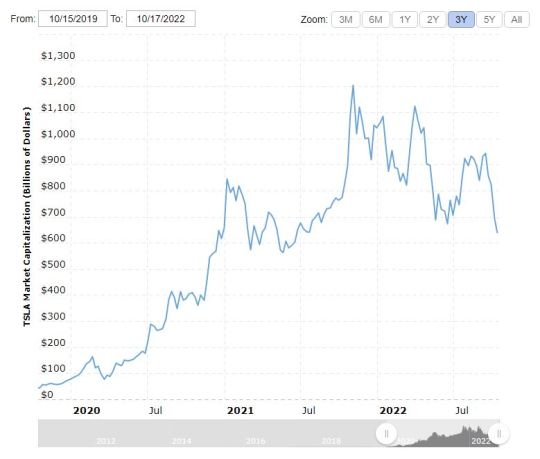
3-year chart
0 notes
Note
for everyone in yr inbox that feels anxiety when thrifting/wearing thrifted clothes- hello! fashion student who's actually studying the rise of thrifting rn! it's becoming increasingly popular alongside the rise of sustainable/ethically made clothing, to the point that many are grouping them together as a macrotrend (along w other sustainable/ecofriendly behaviors!) the point is that many people are thrifting more frequently for many reasons, and it's becoming an increasingly low chance that people are thinking ill of/judging you for it. happy thrifting, may you find something wonderful in your price range!!!!!
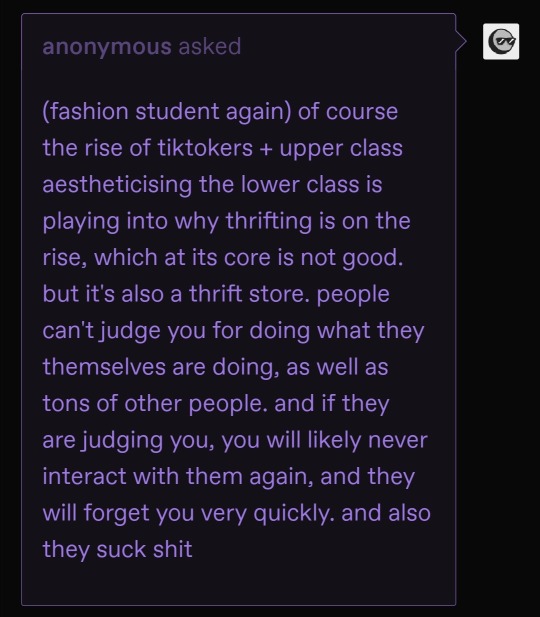
thanks so much for sharing this, it's really interesting as well as helpful!
775 notes
·
View notes
Text
Several companies that produce commonly used puberty blockers such as Valera Pharmaceuticals, Endo International and TerSera Therapeutics (pharmaceutical technology)
valera was acquired by indevus, operating at a net loss of $11m and $50m, respectively (SEC). endo intl q4 2022 net loss $2.9b (company site). tersera average net revenue $100-500m (incfact). for contrast, pfizer 2022 net revenue $31b (macrotrends)
thus we rate roisin murphy's claim that "big pharma" is "profiting" off puberty blockers trivially false: small pharma is mostly operating at a loss to make them with an additional editorialization that it's really disappointing to find she was so easily manipulated toward an ideology of hate following a decades long career of writing grade-A love songs
6 notes
·
View notes
Text
people change their styles according to current trends every 5 seconds. Just find what u like and stick with it. Following microtrends seems to be worse than following macrotrends lol
#personal#seeing people post vids of clothes they regret buying less than a yr ago like ?#does no one ask themselves if the clothes/shoes they purchase rn will be something that theyll wear 10 yrs from now?#or if it’s gonna be a consistent piece in their wardrobe?#theres no need to buy 1000 new shirts just bc u want to follow trends/got inspired by influencers making haul vids#find ur own style and stick with it lol even if it isnt considered ‘fashionable’. who gives a fuck
6 notes
·
View notes
Text
i think it was so funny when ppl who work in the fashion industry (one particular person worked in brand forecasting for fast fashion brands. which makes this whole thing funnier) went on social media to say that fashion industry people werent given priority in fw and they were kind of leveled out with the social media "influencers" (which were prominent people in fashion communities on social media) as if normal people dont have a say in fashion and what sells when the trend circle is so short now that brands literally cannot keep up with production (the miu miu skirt was "out" before it hit fast fashion brands) and theres no way they can. there are overarching macrotrends like watered down harajuku fashion (marc jacobs heaven etc) that high fashion brands do not cater to now at all this will happen in like 2 years. as a trend forecaster u should be grateful that they invite normal people to the table cause it will literally make ur job easier and provide info to fast fashion brands that will help sell their products but ur complaining that normal people are on your level
8 notes
·
View notes
Text
Five steps of Wikipedia for Friday, 29th March 2024
Welcome, dobrodošli, mirë se vjen, croeso 🤗
Five steps of Wikipedia from "Riyadh Al-Arini" to "1948 Arab–Israeli War". 🪜👣

Start page 👣🏁: Riyadh Al-Arini
"Riyadh Al-Arini (Arabic:رياض العريني; born 11 August 1989) is a Saudi football (soccer) player who plays as a midfielder. He played in the Pro League for Al-Hazm...."
Step 1️⃣ 👣: Saudi Arabia
"Saudi Arabia, officially the Kingdom of Saudi Arabia (KSA), is a country in West Asia and the Middle East. It covers the bulk of the Arabian Peninsula and has a land area of about 2150000 km2 (830000 sq mi), making it the fifth-largest country in Asia and the largest in the Middle East. It is..."

Image by See File history below for details.
Step 2️⃣ 👣: 1973 oil crisis
"In October 1973, the Organization of Arab Petroleum Exporting Countries (OAPEC) announced that it was implementing a total oil embargo against the countries who had supported Israel at any point during the Fourth Arab–Israeli War, which began after Egypt and Syria launched a large-scale surprise..."
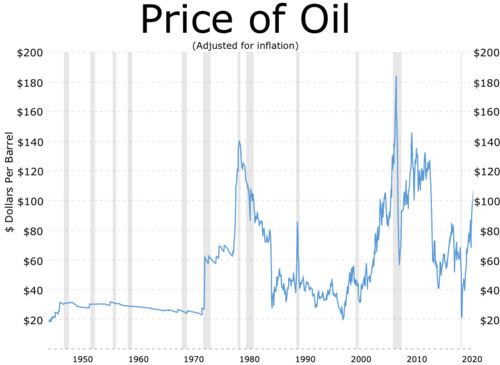
Image by Macrotrends
Step 3️⃣ 👣: 1947–1948 civil war in Mandatory Palestine
"The 1947–1948 civil war in Mandatory Palestine was the first phase of the 1947–1949 Palestine war. It broke out after the General Assembly of the United Nations adopted a resolution on 29 November 1947 recommending the adoption of the Partition Plan for Palestine.During the civil war, the Jewish and..."
Step 4️⃣ 👣: 1920 Nebi Musa riots
"The 1920 Nebi Musa riots or 1920 Jerusalem riots took place in British-controlled part of Occupied Enemy Territory Administration between Sunday, 4 April, and Wednesday, 7 April 1920 in and around the Old City of Jerusalem. Five Jews were killed and several hundred injured; four Arabs were killed,..."

Image by Unknown - not relevant for the licence
Step 5️⃣ 👣: 1948 Arab–Israeli War
"The 1948 Arab–Israeli War, also known as the First Arab–Israeli War, followed the civil war in Mandatory Palestine as the second and final stage of the 1948 Palestine war. The civil war became a war of separate states with the Israeli Declaration of Independence on 14 May 1948, the end of the..."

Image licensed under CC BY-SA 3.0? by Micha Perry
0 notes
Text
Why There Won’t Be a Recession That Tanks the Housing Market
Why There Won’t Be a Recession That Tanks the Housing Market
There’s been a lot of recession talk over the past couple of years. And that may leave you worried we’re headed for a repeat of what we saw back in 2008. Here’s a look at the latest expert projections to show you why that isn’t going to happen.
According to Jacob Channel, Senior Economist at LendingTree, the economy’s pretty strong:
“At least right now, the fundamentals of the economy, despite some hiccups, are doing pretty good. While things are far from perfect, the economy is probably doing better than people want to give it credit for.”
That might be why a recent survey from the Wall Street Journal shows only 39% of economists think there’ll be a recession in the next year. That’s way down from 61% projecting a recession just one year ago (see graph below):
Most experts believe there won’t be a recession in the next 12 months. One reason why is the current unemployment rate. Let’s compare where we are now with historical data from Macrotrends, the Bureau of Labor Statistics (BLS), and Trading Economics. When we do, it’s clear the unemployment rate today is still very low (see graph below):
The orange bar shows the average unemployment rate since 1948 is about 5.7%. The red bar shows that right after the financial crisis in 2008, when the housing market crashed, the unemployment rate was up to 8.3%. Both of those numbers are much larger than the unemployment rate this January (shown in blue).
But will the unemployment rate go up? To answer that, look at the graph below. It uses data from that same Wall Street Journal survey to show what the experts are projecting for unemployment over the next three years compared to the long-term average (see graph below):
As you can see, economists don’t expect the unemployment rate to even come close to the long-term average over the next three years – much less the 8.3% we saw when the market last crashed.
Still, if these projections are correct, there will be people who lose their jobs next year. Anytime someone’s out of work, that’s a tough situation, not just for the individual, but also for their friends and loved ones. But the big question is: will enough people lose their jobs to create a flood of foreclosures that could crash the housing market?
Looking ahead, projections show the unemployment rate will likely stay below the 75-year average. That means you shouldn't expect a wave of foreclosures that would impact the housing market in a big way.
Bottom Line
Most experts now think we won't have a recession in the next year. They also don't expect a big jump in the unemployment rate. That means you don’t need to fear a flood of foreclosures that would cause the housing market to crash.
0 notes
Text
0 notes
Text
Germany fully bought into the green energy transition, but its economy is now showing serious signs of weakness as a prolonged energy crisis runs its course.
The country is aiming to have its energy supply and demand reach “net-zero” emissions by 2050, relying on sources like wind, solar and hydrogen fuels after former Prime Minister Angela Merkel decided in 2011 to eventually shutter the country’s nuclear power plant fleet. Despite the German government’s regulatory and spending blitz to usher in the green transition, the country is not on track to meet its climate goals, but its decision to rely on intermittent green energy generation has contributed to an ongoing energy crisis that is crippling its economy.
“Hollowing out the economy is not benefiting the German people, nor is it helping climate change,” Diana Furtchtgott-Roth, Director of the Center for Energy, Climate and Environment at the Heritage Foundation, told the Daily Caller News Foundation. “It is not reducing emissions, because manufacturing is being shifted to other nations, like China and India, that use dirtier energy. The German economy is going down, and their people do not have the jobs and economic opportunities that they used to.” Germany ultimately closed the last of its nuclear power plants in April 2023. Several months later, the German government announced that it would activate coal-fired power plants to ensure adequate supply through this winter.
The signs of Germany’s economic withering are numerous, perhaps most visible in the fact that it shrank in 2023 after growing by less than 2% in 2022, according to Euronews. The country is facing the high borrowing costs and inflationary pressures that are dogging many of the West’s economies, but sticky energy inflation remains the key factor in the country’s economic malaise, both for consumers and corporations, according to Reuters.
In the third quarter of 2023, the German electricity sector generated 20% less power than it did in the same period in 2022, according to the GMK Center. On the demand side, Germany’s 2023 energy consumption was about 8% lower than 2022’s levels, and about 25% lower than energy consumption in 1990, according to Clean Energy Wire.
The country’s consumer price index for electricity is nearly 50% higher in December 2023 than it was in January 2021, according to data from Eurostat. Executives of industrial companies are warning that high energy costs are making their continued presence in Germany potentially untenable, while many firms are beginning to move their operations out of Germany, according to Politico.
Germany’s November 2023 manufacturing Purchasing Managers’ Index (PMI), which is “a gauge of overall business conditions based on measures of new orders, output, employment, supplier delivery times and stocks of purchases,” indicate that executives across the entire sector are decidedly pessimistic about their future prospects and the vitality of the sector, according to S&P Global. It is difficult to understate the potential ramifications of the decline of German manufacturing given that the country earned its reputation as Europe’s economic powerhouse primarily on the strength of its manufacturing sector, which has typically provided about 20% of the country’s annual gross domestic product since 1991, according to World Bank data analyzed by Macrotrends.
Germany’s manufacturers are not the only ones feeling the pinch. German farmers recently engaged in a weeklong wave of protest across the country, voicing their anger about the government’s proposal to plug a massive budget gap by eliminating subsidies that allow them to stay in business.
The budget gap especially threatens climate-related initiatives, many of which still require government subsidies to have a chance at succeeding even after the government has already spent hundreds of billions of euros on the green agenda, according to The New York Times.
Meanwhile, the country’s residential real estate prices have fallen precipitously over the past year or so, according to Reuters. The third quarter of 2023 saw residential real estate prices dropped by 10% year over year, a development which Reuters describes as a “grim sign” for the German economy.
While Germany’s energy crisis was many years in the making, Russia’s ongoing war with Ukraine kicked it into overdrive. Before the war started, Germany had become reliant on cheap Russian natural gas, even amid warnings — including one from former U.S. President Donald Trump — that depending on Russian exports would afford Russian President Vladimir Putin significant geopolitical leverage over Europe.
The conflict is still raging, and it remains unclear when it will end or what the terms of concluding the war will look like. One such sticking point is whether or not Russia and Ukraine will be able to renegotiate a natural gas transit deal to replace the current agreement, which expires in 2024, according to Bloomberg News. The current Russia-Ukraine transit agreement allows for Russian gas to flow through Ukraine and into other European countries in exchange for Russian fee payments to Ukraine, according to Bloomberg. Without a new deal in place, Germany and Western Europe may be at risk of enduring another supply pinch, prompting German Economy and Energy Minister Robert Habeck to warn in June that “there is no secure scenario for how things will turn out” for the German economy if it is unprepared for another round of supply disruption.
The meager economic outlook and energy crisis is also shaking up German politics. The Alternative for Germany (AfD), the country’s leading right-wing populist party, has seen its popularity more than double since the Russian invasion commenced, according to polling data aggregated by Politico. About 80% of the German population is unsatisfied with the performance of the current coalition, and more than half of the country wants elections to occur before 2025, their currently scheduled date, according to Bloomberg News.
The German Federal Ministry for Economic Affairs and Climate Action did not respond immediately to a request for comment.
0 notes
Text
youtube
2023 microtrend according to my Discover Weekly playlists: sounding like Porter Robinson (should be a macrotrend TBH), as represented by wilo wilde and the dubiously named gush.
1 note
·
View note
Text

If you’re worried about a coming recession, you’re not alone. Over the past couple of years, there’s been a lot of recession talk. And many people worry, if we do have one, it would cause the unemployment rate to skyrocket. Some even fear that a spike in unemployment would lead to a rash of foreclosures similar to what happened 15 years ago. However, the latest Economic Forecasting Survey from the Wall Street Journal (WSJ) reveals that, for the first time in over a year, less than half (48%) of economists believe a recession will actually occur within the next year. If those expert projections are correct, more people will lose their jobs in the upcoming year. And job losses of any kind are devastating for those people and their loved ones. However, the question here is: will there be enough job losses to cause a wave of foreclosures that will crash the housing market? Based on historical context from Macrotrends and the Bureau of Labor Statistics (BLS), the answer is no. That’s because the unemployment rate is currently near all-time lows. Moving forward, projections show the unemployment rate is likely to stay beneath the 75-year average. And that means we won’t see a wave of foreclosures that would severely impact the housing market. Most economists no longer expect a recession to occur in the next 12 months. That’s why they also don’t expect a dramatic rise in the unemployment rate that would lead to a rash of foreclosures and another housing market crash. If you have questions about unemployment and its impact on the housing market, DM me.
#exprealty#neilsingerman#losangeles#realestate#homeownership#homebuying#realestategoals#realestatetips#realestatelife#realestatenews#realestateagent#realestateexpert#realestateagency#realestateadvice#realestateblog#realestatemarket#realestateexperts#realestateagents#instarealestate#instarealtor#realestatetipsoftheday#realestatetipsandadvice#keepingcurrentmatters
0 notes
Text
Post 2: Amazon Delivery
To start I just want to give this companies background , in 1994 Jeff Bezos that was a former Wall Street hedge fund executive incorporated Amazon.com . He chose the name primarily because it began with the first letter of the alphabet and because of its association with the vast American river. The company at the time sold books online and they were not the first to do so it was a tough time to get ahead of the competition . Bezos thought to succeed as an online retailer , a company needed to "Get Big Fast" a slogan he had printed on employee T-shirts. Amazon.com did grow so much in success to the point in 1999 its founder was Time magazine's Person of the year . In May 1997 Amazon became a public company allowing funds to come in and allow them to grow in services which gained its customer loyalty . Bezos claimed the company was not a retailer but a technology company . One of Amazon’s most recognizable and profitable services was first introduced in February 2005 known as “Amazon Prime”. Debuting as an unlimited two-day delivery subscription at $79 a year, Amazon Prime started with relatively limited consumer attraction due to the concept of online shopping being somewhat new and subscription prices still being too expensive to some.
Within a couple of years there was changes made which led to the expansion of the services and subtle changes one of them being the Prime Video portion of the subscription, Amazon started to see substantial growth with their subscription service in the 2010s. In an article by Colby Hopkins is states "According to data provided by Search Logistics, Amazon has seen an increase of roughly $29 billion in net sales from 2013 to 2021, with 2021 seeing a total of $31.77 billion in net sales of Amazon Prime. Additionally, “Amazon subscription value has more than doubled since 2017” (Search Logistics, 2022). This was in large part due to an increase of approximately 28 million subscribers from the years 2019-2021, as COVID-19 was at its worst. Based on the current trajectory of the previous years, Search Logistics also predicts that there will be an estimated total of 168.3 million subscribers by the year 2025. " Amazon is in fact a product-based company, and their company revenue for the year 2022 was $513.98 B. The employee count for them came in at 1,541,000 and the mission statement for the company is "to be Earth's most customer centric company".
Pereira, D. (2023, February 28). Amazon Mission and Vision statement. Business Model Analyst. https://businessmodelanalyst.com/amazon-mission-and-vision-statement/#:~:text=Amazon’s%20mission%20statement%2C%20%E2%80%9Cto%20be,the%20importance%20of%20customer%20satisfaction.
Investment, Z. (n.d.). Amazon: Number of employees 2010-2023: AMZN. Macrotrends. https://www.macrotrends.net/stocks/charts/AMZN/amazon/number-of-employees#:~:text=Interactive%20chart%20of%20Amazon%20(AMZN,a%2023.88%25%20increase%20from%202020.
Amazon (AMZN) - revenue. CompaniesMarketCap.com - companies ranked by market capitalization. (n.d.). https://companiesmarketcap.com/amazon/revenue/#:~:text=According%20to%20Amazon’s%20latest%20financial,sale%20of%20goods%20or%20services.
0 notes
Text
Russia Electricity Access 1990-2023 | MacroTrends
0 notes
Text
On this day in Wikipedia: Saturday, 6th January
Welcome, ようこそ (yōkoso), willkommen, 欢迎 (huānyíng) 🤗
What does @Wikipedia say about 6th January through the years 🏛️📜🗓️?

6th January 2022 🗓️ : Death - F. Sionil José
Francisco Sionil Jose, Philippine novelist (b.1924)
"Francisco Sionil José (December 3, 1924 – January 6, 2022) was a Filipino writer who was one of the most widely read in the English language. A National Artist of the Philippines for Literature, which was bestowed upon him in 2001, José's novels and short stories depict the social underpinnings of..."

Image by Development Academy of the Philippines
6th January 2019 🗓️ : Event - Muhammad V of Kelantan
Muhammad V of Kelantan resigns as the Yang di-Pertuan Agong of Malaysia, becoming the first monarch to do so.
"Sultan Muhammad V (Jawi: سلطان محمد ٥; born 6 October 1969) is Sultan of Kelantan since ascending to the throne in 2010. He previously reigned as the fifteenth Yang di-Pertuan Agong of Malaysia from 2016 until his abdication in 2019. He was proclaimed Sultan of Kelantan on 13 September 2010,..."

Image licensed under CC BY 4.0? by New Zealand Ministry of Foreign Affairs / New Zealand High Commission Kuala Lumpur. MFAT images licenced CC-BY according to terms here https://www.mfat.govt.nz/en/copyright/ and expansion here https://twitter.com/MFATNZ/status/1273066079514812417
6th January 2014 🗓️ : Event - Benefits Street
The first episode of the documentary series Benefits Street aired on Channel 4, prompting discussion in the United Kingdom about welfare dependency.
"Benefits Street is a British documentary series broadcast on Channel 4. It followed the lives of benefit claimants and showed them committing crimes, including a demonstration of how to shoplift, and portrayed a situation in which people are dependent on benefits and lack the motivation to seek..."
6th January 1974 🗓️ : Event - 1973 oil crisis
In response to the 1973 oil crisis, daylight saving time commences nearly four months early in the United States.
"In October 1973, the Organization of Arab Petroleum Exporting Countries (OAPEC) announced that it was implementing a total oil embargo against the countries that had supported Israel at any point during the Fourth Arab–Israeli War, which began after Egypt and Syria launched a large-scale surprise..."
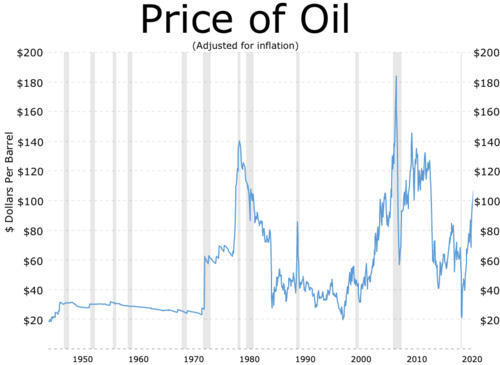
Image by Macrotrends
6th January 1924 🗓️ : Birth - Kim Dae-jung
Kim Dae-jung, South Korean soldier and politician, 8th President of South Korea, Nobel Prize laureate (d. 2009)
"Kim Dae-jung (Korean: 김대중; Hanja: 金大中; Korean pronunciation: [kim.dɛ.dʑuŋ]; 6 January 1924 – 18 August 2009), often referred to by his initials DJ, was a South Korean politician and activist who served as the 8th (15th election) president of South Korea from 1998 to 2003. He was a 2000 Nobel Peace..."

Image licensed under KOGL Type 1? by 대한민국 국가기록원
6th January 1822 🗓️ : Birth - Heinrich Schliemann
Heinrich Schliemann, German archaeologist and businessman (d. 1890)
"Johann Ludwig Heinrich Julius Schliemann (German: [ˈʃliːman]; 6 January 1822 – 26 December 1890) was a German businessman and an influential amateur archaeologist. He was an advocate of the historicity of places mentioned in the works of Homer and an archaeological excavator of Hisarlik, now..."

Image licensed under CC BY-SA 4.0? by
Ed. Schultze Hofphotograph Heidelberg Plöckstrasse 79
6th January 🗓️ : Holiday - Christian Feast day: January 6 (Eastern Orthodox liturgics)
"January 5 - Eastern Orthodox liturgical calendar - January 7 All fixed commemorations below are observed on January 19 by Eastern Orthodox Churches on the Old Calendar.For January 6th, Orthodox Churches on the Old Calendar commemorate the Saints listed on December 24...."

Image by njk92
0 notes
Text
Why the Economy Won’t Tank the Housing Market
Why the Economy Won’t Tank the Housing Market
If you’re worried about a coming recession, you’re not alone. Over the past couple of years, there’s been a lot of recession talk. And many people worry, if we do have one, it would cause the unemployment rate to skyrocket. Some even fear that a spike in unemployment would lead to a rash of foreclosures similar to what happened 15 years ago.
However, the latest Economic Forecasting Survey from the Wall Street Journal (WSJ) reveals that, for the first time in over a year, less than half (48%) of economists believe a recession will actually occur within the next year:
“Economists are turning optimistic on the U.S. economy . . . economists lowered the probability of a recession within the next year, from 54% on average in July to a more optimistic 48%. That is the first time they have put the probability below 50% since the middle of last year.”
If over half of the experts no longer expect a recession within the next year, you might naturally think those same experts also don’t expect the unemployment rate to jump way up – and you’d be right. The graph below uses data from that same WSJ survey to show exactly what the economists project for the unemployment rate over the next three years (see graph below):
If those expert projections are correct, more people will lose their jobs in the upcoming year. And job losses of any kind are devastating for those people and their loved ones.
However, the question here is: will there be enough job losses to cause a wave of foreclosures that will crash the housing market? Based on historical context from Macrotrends and the Bureau of Labor Statistics (BLS), the answer is no. That’s because the unemployment rate is currently near all-time lows (see graph below):
As the orange bar in the graph shows, the average unemployment rate dating back to 1948 is 5.7%. The red bar shows, the last time the housing market crashed, in the immediate aftermath of the 2008 financial crisis, the average unemployment rate was up to 8.3%. Both of those bars are much higher than the unemployment rate today (shown in the blue bar).
Moving forward, projections show the unemployment rate is likely to stay beneath the 75-year average. And that means we won’t see a wave of foreclosures that would severely impact the housing market.
Bottom Line
Most economists no longer expect a recession to occur in the next 12 months. That’s why they also don’t expect a dramatic rise in the unemployment rate that would lead to a rash of foreclosures and another housing market crash. If you have questions about unemployment and its impact on the housing market, let’s connect.
0 notes